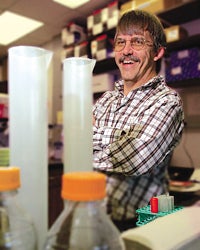ECU researcher seeks vaccine for biological warfare agent
GREENVILLE, N.C. (Nov. 1, 2001) — When Dr. Marty Roop moved to Greenville in January to teach at the Brody School of Medicine at East Carolina University, he brought his research on one of the top biological warfare agents with him.

Dr. Marty Roop, a microbiologist, is looking for a vaccine for Brucella, a potential biological warfare agent. Photo by Cliff Hollis.
Roop, associate professor in the Department of Microbiology and Immunology, for years has worked to understand the bacterium Brucella and develop a vaccine to prevent its nasty, debilitating effects in humans. Unlike anthrax and other better-known biological terrorism agents, Brucella isn”t often fatal but is a powerful biological warfare agent because it can weaken people for up to several months.
“Brucellosis (the disease caused by Brucella) is so infectious and debilitating. Fatalities are rare, but it is a very crippling disease,” Roop explained. The bacterium can cause flu-like symptoms that last for a long time, making it an excellent choice for biological warfare.
“The logistics of taking care of thousands of sick people can be more complex than dealing with thousands of deaths,” Roop said. “In warfare, it can be better to bring your enemy to its knees and cripple them.”
That’s why the Department of Defense and the National Institutes of Health have awarded Roop approximately $1 million in research funding to work on a vaccine for brucellosis. Roop and his lab team work in cooperation with Walter Reed Army Hospital in Washington, D.C., and a handful of medical schools around the country.
Oct. 16, Roop went to Washington, D.C., on a five-person team to brief North Carolina Congressional staff members and Rep. David Price on the resources the University of North Carolina System has to offer as they deal with the threat of bioterrorism.
Roop came to ECU from Louisiana State University Medical Center-Shreveport, where he spent eight years. Five members of his research team moved with him:€” Rosemarie Alcantara (a Fulbright scholar and postdoctoral research associate, who returned to Argentina in mid-October), Tim Brown (research technician), Jason Gee, Mike Hornback and Eric Anderson (doctoral students). Four others have joined the lab: John Baumgartner (research technician), J.T. Paulley and Eleonora Campos (doctoral students), and Richard Read (a British undergraduate student).
Roop’s research focuses on trying to define the genes in the organism that allow it to produce disease in the host. For Brucella abortus, as with anthrax, the natural host is cattle. Other strains of Brucella are found in sheep, goats and swine. These types are more likely to be used as an agent of bioterrorism or biological warfare than B. abortus.
“If we know how (Brucella) produces disease, then we can use genetic engineering to produce strains without the ability to produce disease,” he said. “We just can’t use a killed vaccine; we have to have a live vaccine. The organism must be living and attenuated to be effective.”
A vaccine to prevent brucellosis in animals exists but humans can’€™t use that same vaccine because animals are the natural hosts for the bacteria and that vaccine makes people sick. “We’re the accidental hosts,” Roop explained. “It’s not known why the vaccine doesn’€™t work in humans. I wish I knew the answer to that.”
Roop pointed out that Brucella would not be a great choice for bioterrorism because it is seldom lethal. “These terrorists seem to want a more insidious shock effect,” he said. “It seems they want to kill a lot of people.”